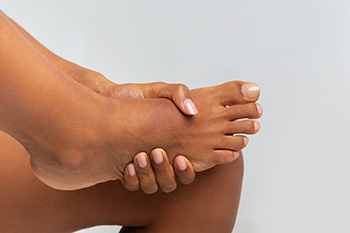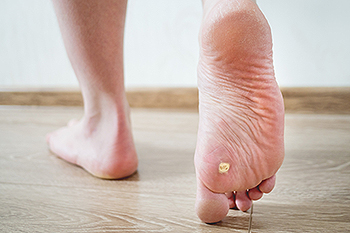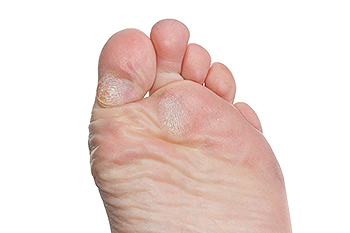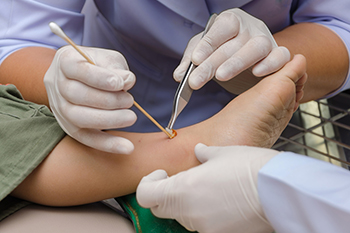Items filtered by date: January 2023
Foot Pain and Tight Shoes

Foot pain, no matter the cause, can be considerably uncomfortable and annoying. Many patients who suffer from foot pain often wonder what the exact cause is. Although the answer may be complicated, one common and often overlooked cause of foot pain is wearing shoes that are too tight. When the feet are feeling painful, or sore from wearing tight shoes there are a variety of different things that can be done to relieve the pain. For instance, you may be able to cure the soreness by performing therapeutic stretches, and there are many different kinds and varieties. One such stretch can be performed in a seated position. You might cross one leg over the other and then weave your fingers in between the toes of the foot that is elevated. By spreading the toes apart, you are essentially stretching them. If you are someone that has foot pain, also consider contacting a podiatrist for an evaluation. Schedule an appointment today.
Foot Pain
Foot pain can be extremely painful and debilitating. If you have a foot pain, consult with Dr. Scott Peters from Ankle & Foot Walk-In Clinic. Our doctor will assess your condition and provide you with quality foot and ankle treatment.
Causes
Foot pain is a very broad condition that could be caused by one or more ailments. The most common include:
- Bunions
- Hammertoes
- Plantar Fasciitis
- Bone Spurs
- Corns
- Tarsal Tunnel Syndrome
- Ingrown Toenails
- Arthritis (such as Gout, Rheumatoid, and Osteoarthritis)
- Flat Feet
- Injury (from stress fractures, broken toe, foot, ankle, Achilles tendon ruptures, and sprains)
- And more
Diagnosis
To figure out the cause of foot pain, podiatrists utilize several different methods. This can range from simple visual inspections and sensation tests to X-rays and MRI scans. Prior medical history, family medical history, and any recent physical traumatic events will all be taken into consideration for a proper diagnosis.
Treatment
Treatment depends upon the cause of the foot pain. Whether it is resting, staying off the foot, or having surgery; podiatrists have a number of treatment options available for foot pain.
If you have any questions, please feel free to contact our office located in Mayfield Village, OH . We offer the newest diagnostic and treatment technologies for all your foot care needs.
What Is a Plantar Wart Caused By?

Warts are growths that can form on various parts of the body. Plantar warts develop on the soles of the feet and grow inward as a result of the weight the feet endure. They generally cause severe pain and discomfort, and walking may become difficult. A wart is caused by the human papillomavirus (HPV), and plantar warts are no different. They can have the appearance of a callus, with small black dots in the center. This particular virus lives and thrives in warm and moist environments, including shower room floors and public swimming pools. It can enter the body through small cuts in the skin on the feet, and it is beneficial to wear appropriate shoes while in these areas. Additional preventive methods consist of keeping the feet as dry as possible, and refraining from sharing towels, shoes, and socks. There are various treatments that can be effective, and it is advised that you consult with a podiatrist who can determine what the best one is for you.
Plantar warts can be very uncomfortable. If you need your feet checked, contact Dr. Scott Peters from Ankle & Foot Walk-In Clinic. Our doctor will assist you with all of your foot and ankle needs.
About Plantar Warts
Plantar warts are the result of HPV, or human papillomavirus, getting into open wounds on the feet. They are mostly found on the heels or balls of the feet.
While plantar warts are generally harmless, those experiencing excessive pain or those suffering from diabetes or a compromised immune system require immediate medical care. Plantar warts are easily diagnosed, usually through scraping off a bit of rough skin or by getting a biopsy.
Symptoms
- Lesions on the bottom of your feet, usually rough and grainy
- Hard or thick callused spots
- Wart seeds, which are small clotted blood vessels that look like little black spots
- Pain, discomfort, or tenderness of your feet when walking or standing
Treatment
- Freezing
- Electric tool removal
- Laser Treatment
- Topical Creams (prescription only)
- Over-the-counter medications
To help prevent developing plantar warts, avoid walking barefoot over abrasive surfaces that can cause cuts or wounds for HPV to get into. Avoiding direct contact with other warts, as well as not picking or rubbing existing warts, can help prevent the further spread of plantar warts. However, if you think you have developed plantar warts, speak to your podiatrist. He or she can diagnose the warts on your feet and recommend the appropriate treatment options.
If you have any questions please feel free to contact our office located in Mayfield Village, OH . We offer the newest diagnostic and treatment technologies for all your foot and ankle needs.
Reminder: When Was the Last Time...?
What Can Cause Tarsal Tunnel Syndrome?

The tibial nerve connects the back of the leg to the inner ankle. Tarsal tunnel syndrome occurs when this nerve becomes pinched and can happen if an injury has occurred. It may also develop if a surrounding tendon becomes inflamed, or from rolling the ankle inward while running. Common symptoms that are generally associated with tarsal tunnel syndrome often include a soreness in the arch or sole of the foot, and the affected area may tingle or become numb. Temporary relief may be found when supportive shoes, custom made orthotics, or arch supports are worn. If you have pain in this part of your foot, it is strongly suggested that you consult with a podiatrist who can determine what the cause is, and offer correct treatment techniques.
Tarsal tunnel syndrome can be very uncomfortable to live with. If you are experiencing tarsal tunnel syndrome, contact Dr. Scott Peters of Ankle & Foot Walk-In Clinic. Our doctor can provide the care you need to keep you pain-free and on your feet.
Tarsal Tunnel Syndrome
Tarsal tunnel syndrome, which can also be called tibial nerve dysfunction, is an uncommon condition of misfiring peripheral nerves in the foot. The tibial nerve is the peripheral nerve in the leg responsible for sensation and movement of the foot and calf muscles. In tarsal tunnel syndrome, the tibial nerve is damaged, causing problems with movement and feeling in the foot of the affected leg.
Common Cause of Tarsal Tunnel Syndrome
- Involves pressure or an injury, direct pressure on the tibial nerve for an extended period of time, sometimes caused by other body structures close by or near the knee.
- Diseases that damage nerves, including diabetes, may cause tarsal tunnel syndrome.
- At times, tarsal tunnel syndrome can appear without an obvious cause in some cases.
The Effects of Tarsal Tunnel Syndrome
- Different sensations, an afflicted person may experience pain, tingling, burning or other unusual sensations in the foot of the affected leg.
- The foot muscles, toes and ankle become weaker, and curling your toes or flexing your foot can become difficult.
- If condition worsens, infections and ulcers may develop on the foot that is experiencing the syndrome.
A physical exam of the leg can help identify the presence of tarsal tunnel syndrome. Medical tests, such as a nerve biopsy, are also used to diagnose the condition. Patients may receive physical therapy and prescriptive medication. In extreme cases, some may require surgery.
If you have any questions please feel free to contact our office located in Mayfield Village, OH . We offer the newest diagnostic and treatment technologies for all your foot and ankle needs.
Caring for Calluses

The feet need to be pampered, and regularly pampering the feet can be fun. Making your foot care routine a ritual of self-care and luxury can make you feel good while you take care of your feet. One step that you might consider incorporating into your everyday foot care is treating calluses. Calluses on the feet can be removed in several different ways. For example, foot creams, gels, and pumice stones can all be used to address the calluses on the feet. Other devices can be used to this end. Namely, patches, peels, and soaks can all be used to get rid of calluses on the feet. If you are someone that enjoys pampering their feet and also has a lot of calluses, please contact your podiatrist today. This foot specialist will be able to help you incorporate callus care into your daily foot care routine.
Everyday foot care is very important to prevent infection and other foot ailments. If you need your feet checked, contact Dr. Scott Peters from Ankle & Foot Walk-In Clinic. Our doctor can provide the care you need to keep you pain-free and on your feet.
Everyday Foot Care
Often, people take care of their bodies, face and hair more so than they do for their feet. But the feet are a very important aspect of our bodies, and one that we should pay more attention to. Without our feet, we would not be able to perform most daily tasks.
It is best to check your feet regularly to make sure there are no new bruises or cuts that you may not have noticed before. For dry feet, moisturizer can easily be a remedy and can be applied as often as necessary to the affected areas. Wearing shoes that fit well can also help you maintain good foot health, as well as making it easier to walk and do daily activities without the stress or pain of ill-fitting shoes, high heels, or even flip flops. Wearing clean socks with closed shoes is important to ensure that sweat and bacteria do not accumulate within the shoe. Clean socks help to prevent Athlete’s foot, fungi problems, bad odors, and can absorb sweat.
If you have any questions please feel free to contact our office located in Mayfield Village, OH . We offer the newest diagnostic and treatment technologies for all your foot and ankle needs.
Cleaning Foot Wounds

Wounds on the feet can develop for any number of different reasons. Commonly, if an individual is walking barefoot and steps on an irregular, sharp, or small object, this may create some kind of wound. Relatedly, foot wounds are common to some diabetics because the loss of feeling in the feet among diabetics makes it more difficult to even notice wounds when they develop. Although wound care is particular to each patient, several general rules of thumb might be useful. Generally, it might be a good idea to clean the wound before dressing it. If a medical professional says that it is permissible to do so, clean the wound with soap and water to fight against infections. It is also important to remember that the wound can also sometimes be dried with a towel so that it is not wet. Having a wet wound that makes the bandage wet might have a host of complications. If you are prone to developing foot wounds (perhaps because you suffer from diabetes or because you frequently walk around barefoot), contact a podiatrist today to see what you can do to ward off foot wounds.
Wound care is an important part in dealing with diabetes. If you have diabetes and a foot wound or would like more information about wound care for diabetics, consult with Dr. Scott Peters from Ankle & Foot Walk-In Clinic. Our doctor will assess your condition and provide you with quality foot and ankle treatment.
What Is Wound Care?
Wound care is the practice of taking proper care of a wound. This can range from the smallest to the largest of wounds. While everyone can benefit from proper wound care, it is much more important for diabetics. Diabetics often suffer from poor blood circulation which causes wounds to heal much slower than they would in a non-diabetic.
What Is the Importance of Wound Care?
While it may not seem apparent with small ulcers on the foot, for diabetics, any size ulcer can become infected. Diabetics often also suffer from neuropathy, or nerve loss. This means they might not even feel when they have an ulcer on their foot. If the wound becomes severely infected, amputation may be necessary. Therefore, it is of the upmost importance to properly care for any and all foot wounds.
How to Care for Wounds
The best way to care for foot wounds is to prevent them. For diabetics, this means daily inspections of the feet for any signs of abnormalities or ulcers. It is also recommended to see a podiatrist several times a year for a foot inspection. If you do have an ulcer, run the wound under water to clear dirt from the wound; then apply antibiotic ointment to the wound and cover with a bandage. Bandages should be changed daily and keeping pressure off the wound is smart. It is advised to see a podiatrist, who can keep an eye on it.
If you have any questions, please feel free to contact our office located in Mayfield Village, OH . We offer the newest diagnostic and treatment technologies for all your foot care needs.

